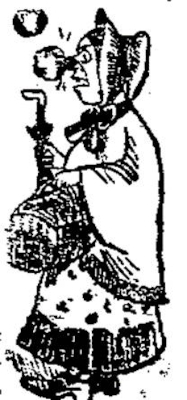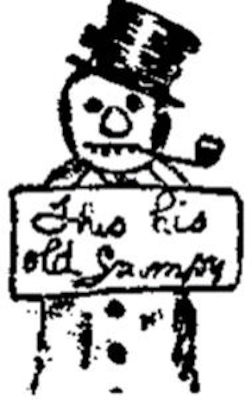This article has been transcribed from a copy of the Cardiff Times in the online collection of scanned Welsh newspapers 1804-1919 in the National Library of Wales, with grateful recognition of the free access accorded to all readers. Paragraph breaks have been introduced for easier reading.
There is no dispute as to who wrote 'the besotted and maudlin poem', 'Beautiful snow', that Samuel so dislikes. The perpetrator was John Whitaker Watson, whose Beautiful Snow and Other Poems was published in Philadelphia in 1869. The first stanza will be enough to explain Samuel’s animus against it: —— David Skilton
O the snow, the beautiful snow,
Filling the sky and the earth below!
Over the house-tops, over the street,
Over the heads of the people you meet,
Dancing, Flirting, Skimming along.
Beautiful snow! it can do nothing wrong.
Flying to kiss a fair lady's cheek;
Clinging to lips in a frolicsome freak;
Beautiful snow, from the heavens above, ;
Pure as an angel and fickle as love!
I believe that there is some dispute, sir, as to who wrote the besotted and maudlin poem, 'Beautiful snow'. Perhaps, sir, it is as well for the author that his identity is not clearly established, for I know certain people who would even cross the broad seas to have a word with him, and to point out his errors to him with a pair of clump soled boots and a 'bludgeon' Beautiful snow, indeed! Isn’t it beautiful when it has been on the ground for a day or two, and has had time to get nicely mingled with soot, and has been partially thawed, and then froze again? Of course it is; and then it is a case of sing heigh-ho! for the broken leg, and ho! for the fractured arm. Beautiful snow; why, the very way in which it comes down is sneaking and deceptive. It pretends to descend in nice, soft, innocent- looking flakes, and a lot of easily-deluded people say, 'Oh, how nice and seasonable it does look!'

But walk out in it, and you’ll find that you progress even worse than if you had spent the whole evening at the 'Bell and Bullfinch' just round the corner, on one of their most convivial nights. And the nasty, furtive way in which it falls breeds cowardice, allied with mischief, amongst our juveniles. What do those juveniles do? Why, they begin by snowballing each other, till they find there is an element of danger in the process, and sometimes 'bleed' stains the snow as the result of a gory nose. But these juveniles are not to be done out of their snowballing for all that, so they court chilblains by making snow-balls, which might in many cases, be much more appropriately called ice-balls; and with a large stock of ammunition of this sort they hide round dark corners, and throw their missiles at everyone they think is too infirm, too timid, or too dignified to rout them out of their ambush. If they see a nice young man with a pretty, white shirt front on, going to a party, they aim full at the said white front in order that they may besmear and spoil it, and that young man's pleasure is most effectually spoilt for the remainder of the evening. And if that young man pursues the gang and captures one of its members, and attempts to administer condign punishment, the usual sympathetic bystander puts in an appearance, and excites the susceptibilities of the crowd which is sure to congregate on such occasions, by referring to the really aggrieved party — the young man — as a brute to meddle with a bit of a lad.

And these same fiend-like boys like to make a mark of a decrepit old gentleman, who has to take every step with a nice deliberation and care; they yell with delight when his hat lies amongst the beautiful snow, and they set up a howl of triumph when they see the said beautiful snow trickling down what they are pleased to call his 'neck hole.' A perfect, godsend to them is a man upon crutches, and the advent of a stout old lady with a basket is provocative of the utmost enthusiasm amongst them especially if she should fall and spill the contents of her basket along the road. And, sir, there is a considerable spice of malice about these urchins, too. They have a habit of, quite accidentally, of course, including stones in the centre of their snowballs, and if you chance to get one of these latter full in your jaw, a perfect handful of teeth is the inevitable result.


Left: The new hat. Right: Oh, that new hat.
Beautiful snow, indeed! What do you think about beautiful snow. I want to know, when you are walking along the causeway with a new silk hat on your head, and when suddenly down comes that 'fearful avalanche' from some shop roof right on top of your chapeau? And what did your servants think about it when Master Tommy tried the scientific experiment of ascertaining whether snowballs would melt in the drawing-room fire? And what do you think of beautiful snow on a morning when the boots you put on are both camp and hard, and turned up at the toes, and are as dull as your own spirits.

This is a snow man.
Snow is nothing but an unmitigated nuisance, and if it is of no good to anyone save the malicious boys, and the mendacious artistes of illustrated papers, who, with such a stock in trade as a bit of snow, some mistletoe and holly, and a dog and a child, can always contrive in the hot summer months to draw up a very delusive but remarkable representation of Christmas. If you are a person who cherishes a regard for his fellow creatures, you, seeing a long, steep, and most dangerous slide at your very door, quite naturally sprinkle salt or ashes or sand on the icy declivity, and what is the result? Why, that the slide-demons throw snowballs through your windows, that they ring your front doorbell frequently and then decamp, knowing perfectly well that you are sure to fall if you pursue them. And they snowball your servant-girl whenever she emerges, and most probably they go and fashion a s[n]ow image supposed to represent yourself, and I having labelled this 'Old Grumpy,' or something equally flattering, they stick it up out on the bit of waste ground opposite, so that you can see it. The very way in which the snow gradually disappears is ungracious, and thoroughly in keeping with its sneaking disposition. As it cannot be allowed to stop at what it is – snow – it turns to ice, and then to slush and puddle, in which form it vents its malice by giving one rheumatism and catarrh (as a consequence of damp feet) and by consistently spoiling one’s nether garments.
Links to Related Material
Last modified 22 March 2022